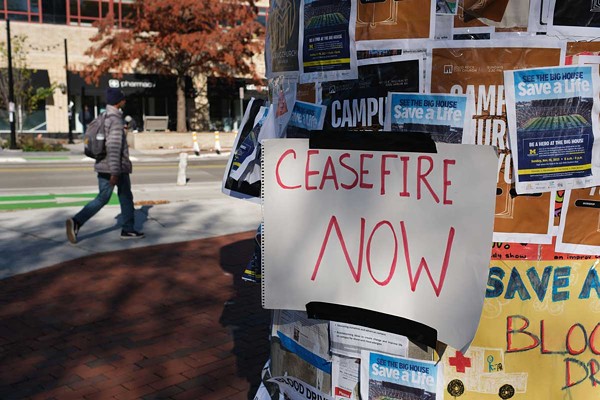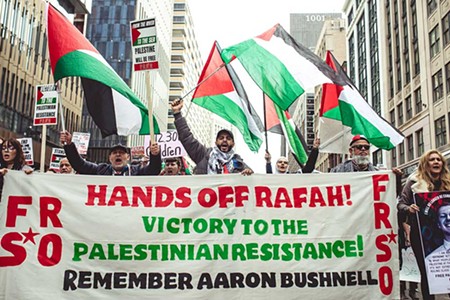A growing coalition of University of Michigan faculty members has united to confront what they see as the university administration’s inadequacies in crisis response concerning the challenges faced by Palestinian, Arab, and Muslim students and staff within the campus community. This collective action follows “biased” statements from the administration over the past five months, coupled with numerous appeals for action from members of the pro-Palestinian community, which have yielded minimal results.
On Oct. 10, 2023, U-M’s President Santa Ono released a “statement regarding Mideast violence” following Hamas’s Oct. 7 attack on Israeli citizens. In the statement, which Ono began with “violence is never the answer,” he expressed that he reached out to universities in Israel to express his concern for students, with zero mention of Gaza or Palestine or the Palestinian lives lost at the hands of Israel.
Since then, the university administration has been criticized for its lack of response to issues affecting Palestinian, Arab, and Muslim communities within the university and its failure to protect pro-Palestinan students and staff from hate and violent threats.
After more than five months now of ongoing violence in Gaza, Ono has barely expressed concern for the over 32,000 Palestinian lives lost. Another statement on Dec. 5 regarding “ongoing campus tensions” disallowed voting on two “controversial and divisive” Central Student Government resolutions related to the conflict.
On Sunday, U-M’s Honors Convocation was disrupted by student activists calling for the university to divest funds in Israel. Many were angered at the protest, although it didn’t begin until the end of the ceremony after all student awards were given out.
Following the recent event, the university proposed a policy on Wednesday that states “no one has the right to infringe on the exercise of others’ speech and activities by disrupting the normal celebrations, activities, and operations of the University.” Feedback on the proposal is currently being accepted from Ann Arbor campus students, faculty, and staff members until April 3.
Also on Wednesday, U-M faculty members released a report, the 2024 Palestinian, Arab, and Muslim U-M Communities’ Survey, which highlights key concerns about the university’s response to the conflict including one-sided communications, discrimination, and a demand for action.
“Institutional behavior has been one-sided and unequal, fostering an environment where anti-Palestinian and anti-Arab sentiments are normalized, while structural Islamophobia is allowed to proliferate unchecked,” the report states. “Among the thousands of U-M’s Muslim, Arab, and Palestinian community members, there exists a pervasive sentiment of being neglected and endangered by an institution that appears indifferent to their fundamental rights to a secure and dignified working and learning environment.”
In the survey, 90% of respondents expressed dissatisfaction with the university’s communications regarding Gaza, and 89% deemed the university’s efforts to combat Islamophobia as inadequate.
Of the 308 respondents who represent faculty and staff, 50% have contemplated leaving the university due to its treatment or messaging regarding Palestinians.
The survey was conducted online from March 17-21 and represents U-M students, alumni, faculty and staff, and parents and community members among the university’s anti-Islamophobia and pro-Palestinian communities.
Overall, 78% of respondents desire a structured U-M Strategy to combat Islamophobia and anti-Palestinian racism.
The faculty coalition is calling on the university administration to conduct formal assessments that engage with the needs and priorities of Palestinian, Arab, and Muslim constituents. Emphasizing the importance of fostering an inclusive and supportive environment for all members of the university community, they urge the administration to take tangible steps toward addressing these pressing issues.
Many of the surveyed faculty and staff left additional written feedback on the survey. Here are some of their responses:
“Ono’s first statement about Oct 7 highlighted the UM connections to Israeli universities. Now that Israel has destroyed all universities in Gaza and murdered dozens of academics and hundreds of students, not a peep and a clear example of bias.”
“I was told by my department that I could not wear a bracelet that is simply the colors and shapes of the Palestinian flag at work in late October or early November because ‘I had to stay neutral’ as I have been watching a genocide unfold live/nearly live on my phone each evening. I complied but was hurt and frustrated that I was hired partly for my human rights background but I could not show my solidarity with an oppressed people under attack.”
“They feel disillusioned by the University, feel ashamed of the University, and distrustful of authority. They feel that what they are being taught about social justice is a lie. As a Jew, I feel the University’s attempts to combat antisemitism are disingenuous and racist. They send a clear message that the University prioritizes feelings of comfort among predominantly white Jewish students over the safety of Palestinian and Muslim students. Antisemitism is very real and dangerous — but it is separate from Zionism and the University makes no attempt to separate them. False claims of antisemitism when students make legitimate critiques of Israel policy make all Jews less safe.”
“At work I am afraid to mention Palestine, due to fear of backlash. I’m considering a PhD, but cannot justify pursuing a degree here again, despite being an alum. If UM does not divest I truly believe they will be remembered as being on the wrong side of history and complicit in genocide.”
“I am no longer proud to work for UMich, having seen the aggressive and militant response of university admin/police to students advocating for transparency/divestment of funds given to Israel. I have applied and been admitted to a PhD program at UMich, but morally I am having a hard time with signing on to represent and affiliate myself with the university. I love my job and I love the field I work in, and I used to love UMich, but I feel sick knowing that my work supports a university that funds the horror in Gaza. If I do not attend UMich next fall, it will be because of this.”


